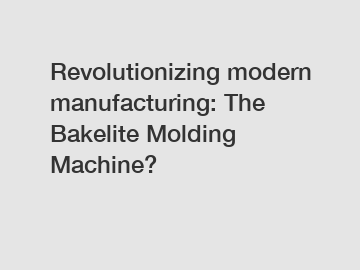Revolutionizing modern manufacturing: The Bakelite Molding Machine?
Apr. 05, 2024
When we think of modern manufacturing, we often picture massive factories humming with the latest technology and robots seamlessly executing tasks with precision. However, there was a time when manufacturing was a much more manual and labor-intensive process. This all changed with the invention of the Bakelite molding machine, a revolutionary innovation that transformed the industry forever.
Bakelite, also known as polyoxybenzylmethylenglycolanhydride, was the first synthetic plastic ever created. Developed by Belgian chemist Leo Baekeland in 1907, Bakelite quickly gained popularity due to its durability, heat resistance, and electrical nonconductivity. It was used in a wide range of products, from electrical insulators to jewelry and even firearm parts.
However, the process of manufacturing Bakelite products was time-consuming and inefficient. Traditional methods involved heating raw Bakelite powder and then pouring it into molds by hand, a laborious and inconsistent process. This all changed with the invention of the Bakelite molding machine.

The Bakelite molding machine was a game-changer in the world of manufacturing. It automated the process of molding Bakelite products, drastically increasing efficiency and reducing production costs. The machine worked by heating the Bakelite resin to a specific temperature and then injecting it into molds under high pressure. This resulted in products that were more uniform in size and shape, with smoother surfaces and fewer imperfections.
One of the key benefits of the Bakelite molding machine was its versatility. It could produce a wide range of products, from small electrical components to larger items like door knobs and radio cases. This flexibility allowed manufacturers to streamline their production processes and meet the growing demand for Bakelite products.
Another significant advantage of the Bakelite molding machine was its speed. Traditional molding methods could take days or even weeks to produce a single product, while the machine could churn out hundreds of items in a matter of hours. This exponential increase in production capacity enabled manufacturers to keep up with consumer demand and expand their businesses.
The impact of the Bakelite molding machine was felt across various industries. The automotive sector, for example, used Bakelite to create durable and lightweight components for cars, leading to improvements in fuel efficiency and performance. The electronics industry also benefited from the machine, as Bakelite was an excellent insulator for electrical components.
Overall, the Bakelite molding machine revolutionized modern manufacturing by making the production process faster, more efficient, and more cost-effective. It set a new standard for quality and consistency in the industry, paving the way for further advancements in plastics manufacturing.
Today, the legacy of the Bakelite molding machine lives on in the form of modern injection molding technology. While the machines themselves have evolved and become more sophisticated, the basic principles remain the same. Manufacturers around the world continue to use injection molding to create a wide range of products, from consumer goods to medical devices.
In conclusion, the Bakelite molding machine was a groundbreaking invention that transformed the manufacturing industry. Its automation of the molding process revolutionized the way products were made, leading to increased efficiency, lower costs, and higher-quality goods. The legacy of the Bakelite molding machine lives on in modern manufacturing practices, serving as a testament to the power of innovation in shaping the world around us.
Are you interested in learning more about plug cord making machine, bmc injection moulding machine, bakelite handle making machine? Contact us today to secure an expert consultation!
136
0
0

Comments
All Comments (0)